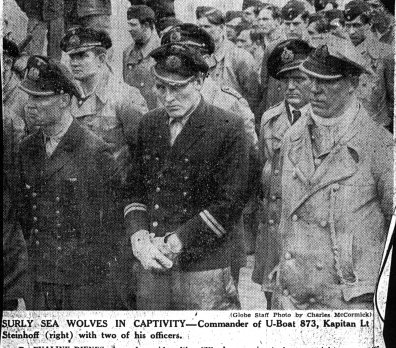
| When I talked in German with two members of U-boat crew 873 last night they were eager to say that American prisoners were treated "very well in Germany" and that they would be happy if America would accord them the same treatment. Finster, a 29 year old oberlieutenant, told me that he had seen prisoners in southern Germany, and Landsgraff, a seaman who was with Finster, says that he saw some English prisoners of war near Leipzig, and claimed that his farm used to supply them regularly with "the best of food". The prisoners interviewed were the executive officer of the submarine. Oberleutnant Aibert Finster, and apprentice seaman, Relner Landsgraff 20. Both men were tall, blond, well fed. The Nazi officer remarked that "even the greatest Generals can lose." Landsgraff boastingly declared that "it would never have come to this had Germany been given a chance to fight her enemies one by one, for only the masses of men and material decided this battle." And, after a moment's thought, he said softly, "We have not really lost this war." Finster, who was born in Hamburg, is married, and a professional naval man, who had been at sea since 1934. He has parents in Hamburg who: "probably are dead by now." He showed much awe for American bombers. When told that Hamburg finally was declared an open city, he was surprised, but added: There is not much left of the city anyhow. When I was home last Christmas, Hamburg was already "Kaputt," Finster said that he had relatives in the United States, but that he did not wish to get in touch with them. The German seaman, born in Burna, small town in the district of Leipzig, volunteered for the Navy in 1943. Previously he had worked as an apprentice in a wholesale food company. He has three brothers who were formerly in the Wehrmacht, but has not heard from them since last December. On board the U-873, Landsgraff was a cook and did not man a military station. When submarine commander told them of Hitler's death on May 6, the Nazi seamen remembered feeling "pretty badly" but thought that "since Doenitz took over right away, they were not as bad as they could be." The German officer said that Doenitz was "the only man worthy of the high position." Hitler had died in battle – that was the unanimous opinion of the Nazis. "But," the 20 year old continued, "his ideas live on." The Lieutenant confessed that "Hitler had done a lot for me," and certainly, nobody would feel like contradicting this statement. The Nazi officer heard for the first time of President Roosevelt's death this morning from the American crew on the destroyer-escort which intercepted the U-873. "I rather would not form any judgment about Roosevelt," the officer said. "I am no statesman." Although they knew that Germany had capitulated, the two supermen, and especially the younger one did not seem "defeated." Toward the end of the talk an issue of a magazine depicting the horrible scenes at Belsen concentration camp was shown to Lansgraff and the captions of the pictures translated into German. He remained perfectly silent for a while, staring at the photos. He had never heard of Belsen; he had (missing rest of the article) |